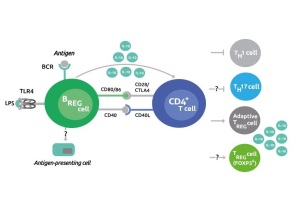In my previous blogs, I invited you to read about the relevance of the B7-1 : CD28, B7-1 : CTLA4, the BLTA:HVEM, CD47:SIRPα , the GITR:GITRL and the PD-1/PD-L1/PD-L2 pathway for immunotherapy screenings and discussed the research products available to study these pathways. Today, I’d like to focus on the CD40:CD40L pathway.
The CD40:CD40L pathway is another highly studied, co-stimulatory pathway that affects both humoral and cell-mediated immunity.
CD40 is constitutively expressed on B-cells, macrophages, and dendritic cells (DC), while CD40L (also known as CD154), is primarily expressed on T-helper cells shortly after activation (although it has also been found on other immune effector cells).
CD40:CD40L binding causes target B-cells to grow and undergo isotype switching. It also causes macrophages to up-regulate their expression of B7 and MHC II proteins, which in turn stimulates the T-helper cells even further.
CD40 is also expressed on most advanced human tumors, and anti-CD40 antibodies are in clinical use for myelomas and leukemias.
Similarly, soluble CD40L (sCD40L) binds to CD40 on cancer cells and induces antitumor activity both in vitro and in vivo. sCD40L can directly inhibit growth and induce apoptosis in many different human tumors, including breast, ovarian, cervical, bladder, non-small cell lung, and squamous epithelial carcinoma. CD40L also exhibits indirect anti-tumor activity by enhancing anti-tumor immune responses by B- and T-cells. Recently researchers have used adenovirus expressing CD40L to successfully treat invasive bladder cancer and chronic lymphocytic leukemia. They have also demonstrated that sCD40L fused to tumor targeting antibody fragments caused targeted induction of cancer cell death.
CD40L has potential for treatment of other diseases as well. CD40L promotes inflammation and coagulation. CD40/CD40L blockade effectively stops clinical disease progression and CNS inflammation in a mouse model of multiple sclerosis, and also prevents the induction of other autoimmune models such as lupus, arthritis, and autoimmune diabetes. CD40L blockade also shows promise as a treatment to prevent thrombosis following heart surgery and as an immunosuppressant to curb the response to transplanted tissue.
CD40:CD40L involvement in diseases is becoming so popular, that now biotech companies (like BPS Bioscience) are striving to provide highly calibrated CD40 & CD40L recombinant proteins for assay developers and drug discoverers. Interestingly, a wide range of CD40-related immuno-assays (from ELISA to antibody arrays and quantitative protein profiling assays) are also commercially available to make CD40:CD40L studies easier.
Interested in CD40:CD40L interaction or any other specific pathways? Don’t hesitate to leave a message below.
Sources:
- Pesonen, S. et al., Cancer Res 72(7): 1621-31 (2012)
- Law, C.L., and Grewal, I.S., Therapeutic Targets of the TNF Superfamily, Landes Bioscience, p. 8-36 (2009)
- Mauri, C. & Blair, P.A., Nature Reviews Rheumatology 6: 636-643 (2010)


